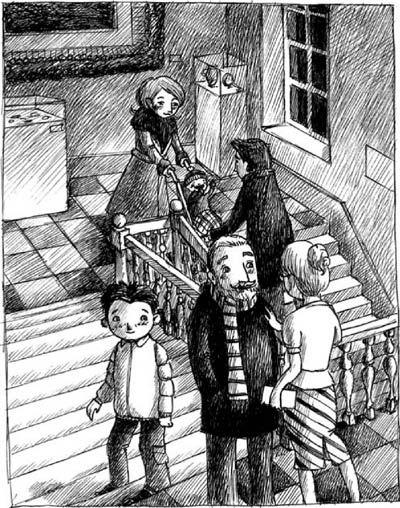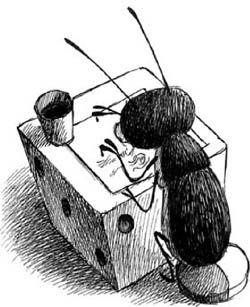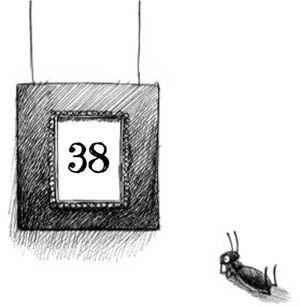Masterpiece (31 page)
Authors: Elise Broach

“I’ve noticed details I never saw before,” Christina said excitedly. “The line of Prudence’s jaw, the way Justice’s hand rests here. It’s as if the drawings speak to one another.”
Karl smiled at her. “They were meant to hang together,” he said. “You can tell.”
“They certainly make a nice arrangement,” Mrs. Pompaday added, not to be outdone. “James, you should consider doing a group of miniatures like this. It would be fetching, really.” She turned to Christina. “He has a gift, you know,” she confided.
“Oh, I know,” Christina said, smiling at James.
He
does
have a gift
, Marvin wanted to say.
It’s just not what you think it is
.
“This exhibit is going to bring new attention to Dürer,” Christina continued. “I can feel it. Museum admissions today are at a record high already. We’ve had dozens of calls from the media. The return of the drawings is getting international news coverage. I think Dürer may finally get the interest he deserves!”
As the others continued to admire the drawings, James tugged her aside. “What about Denny?” he asked anxiously. “Do the police know where he is?”
Christina shook her head. “They’re watching the airports in Germany. Nothing yet.”
“Do you think they’ll catch him?”
Christina pursed her lips. “I don’t know, James.”
“I hope they don’t,” James said. “I like Denny.”
“I do too.” Christina sighed.
James watched her soberly. “Do you think he’s mad at me?” he asked.
“Oh, no, James, I don’t think so,” she answered firmly. “I think that, wherever he is, he must be relieved in a way. Even though things didn’t turn out as he’d planned, at least it’s over.” She tilted her head, looking at the four miniatures. “It’s like when you tell a lie and then you have to tell more lies because of it, to cover it up. Have you ever done that? And even if it’s horrible and embarrassing to be caught, it’s also a relief at some level . . . you know? Because then you can stop doing this thing you wished you’d never done in the first place.”
James looked at her. “Yeah. I know what you mean,” he said finally.
Marvin knew he was thinking about his own drawings. It was so complicated and exhausting to keep up the ruse of James’s artistic genius. And when would it end?
“So,” Christina continued, “I think Denny is probably grateful to you. Or maybe he isn’t right now, but he will be.”
“Will we ever see him again?”
Christina paused. “I don’t know. He committed a serious crime. If he shows up here in the States, he’ll be put in jail. And I know the FBI agents have been talking to the German police to see if they can link him to the other thefts.”
James bit his lip. “I wish he didn’t have to go to jail.”
“I know,” Christina said softly.
“Well, this is a very impressive exhibit,” Mrs. Pompaday interjected, coming to their side. “But we’ve made reservations at a little French place on the Upper West Side and we really should be going. It was nice to meet you, Ms. Balcony.”
“And you,” Christina said. “Thank you for loaning me your wonderful son.”
“Oh, my, I was glad for him to have lessons with you. It’s been a very special opportunity for James.”
Christina smiled quizzically. “I don’t think there’s much I could teach James.”
She escorted them to the museum exit, and as Mr. and Mrs. Pompaday navigated the long flight of stairs with William’s stroller, she turned to Karl.
“Thank you,” she said. “For all of your help. It was really lovely getting to know you two.”
“Won’t we see you again?” James asked, looking crushed. Marvin felt a similar wave of disappointment. He hadn’t even considered that they’d be saying goodbye to Christina.
“Oh, of course!” Christina said. “Any time you like. I hope you’ll keep in touch.” She rested her hand on Karl’s arm.
He looked at her, and Marvin saw his face turn the same shade of pink that James’s did when he was embarrassed about something. “Maybe we could get a cup of coffee sometime?” he asked hesitantly.
Christina smiled. “Absolutely. I’d like that.”
“Good, I’ll call you,” Karl said over his shoulder, ushering James down the steps after the Pompadays.
When they reached the sidewalk, he bent and kissed the top of James’s head. “Love you, buddy.”
“Yeah, Dad,” James said. “You too.”
“We’ll do something on Wednesday, okay?”
Mrs. Pompaday interrupted. “We’ll see, Karl. James may need that time to work on a few new pieces.”
James squirmed, while Karl looked at him sympathetically.
“Okay, we’ll talk later,” he said. He ruffled James’s hair, then headed off down the sidewalk.

At the curb, Mr. Pompaday hailed a cab. William began to howl. He arched his back in protest, kicking the footrest of the stroller.
“Oh, sweetheart,” Mrs. Pompaday crooned. “Yes, yes, you’re hungry. We’re going now.” She unstrapped him from the seat and thrust him into Mr. Pompaday’s arms, calling, “James, put his stroller in the trunk, will you?”
As James folded the stroller and handed it to the cabbie, Marvin felt him hesitate. It was only for a second, but in that fraction of time, Marvin went rigid.
No, James
! he thought, sensing what was about to happen even before he consciously understood it.
He saw James’s right hand reach toward the open trunk at the exact same moment that the cabbie slammed the trunk closed.
There was a sickening, thwarted clunk as the metal trunk crashed down on something that wasn’t meant to be there. And an anguished cry.
James stumbled backward, sobbing in pain, holding his right hand.
No, no, no
, Marvin thought, the word pounding in his head, as he gripped James’s other wrist.
“James!” Mrs. Pompaday screamed.
I
t was on a sunny winter afternoon several days later that Marvin crawled out of the family home and found a little scrap of paper behind the wastebasket, with a shaky black X on it. His heart leapt. He hadn’t seen James since his injury. There had been such a commotion that day: a frantic cab ride to the hospital, James bravely trying to hold back tears, the Pompadays loudly blaming themselves and each other for asking him to put William’s stroller in the trunk. (“What if his hand doesn’t recover? What if he can’t draw again? I shall never forgive myself! Never!” Mrs. Pompaday had vowed.) Then, at the hospital, Marvin had been forced to hold on for dear life as the jacket was tossed aside, and James’s hand was examined and X-rayed and wrapped in a cast.
“Is the damage permanent?” Mrs. Pompaday had demanded anxiously of every doctor who passed through the room.
“It’s a bad break,” one doctor said. “But with physical therapy, he should be fine.”
“No, no, you don’t understand,” Mrs. Pompaday persisted. “My son is an artist, a very talented one. He does these wonderful little miniature drawings—”
The doctor cut her off. “We’ll have to wait and see how it heals.”
Back home again, Marvin endlessly replayed the scene on the street in his head. Had James done it on purpose? There was no way to know. But when he told Mama and Papa his suspicions, they were appalled.
“Of course he didn’t deliberately break his own hand!” Mama cried. “James would never do such a thing.”
“Besides, who knows how that injury will affect the use of his hand?” Papa added. “Forget the drawings; what if James can’t throw a baseball again? Or write his name properly? He’s too smart a boy to take that kind of risk.”
Marvin hoped his parents were right, but he was not so sure. He knew how desperate James had been to stop faking a talent he didn’t have.
Marvin had visited James’s bedroom often over the past few days, but he had somehow always managed to miss him. He’d even lingered under the kitchen table during the Pompadays’ dinner, just to listen to James describe the reaction of the kids at school to his broken hand and to the tale of the stolen drawings. Apparently, they’d crowded around him, full of questions and compliments. They’d squabbled over a chance to sign the cast. They wanted to sit with him at lunchtime. Marvin
hoped the whole thing would make James a celebrity for a while. It would be good for James to have more human friends.
But not ONLY human friends, Marvin thought, feeling lonesome for him. They hadn’t seen each other in days and days, after spending so much time together. It wasn’t even the amount of time, it was the intensity of it—so much had happened to the two of them. Marvin felt changed by it, and he knew James was the only one who could really understand that.
“What’s the matter, darling?” his mother asked him one evening.
“I miss James,” Marvin said. “Do you think he’s forgotten about me?”
“Oh, no, darling, of course not! I know he hasn’t. Come with me. I have something to show you.”
Taking him gently by the leg, Mama led him through the living room to the narrow hallway that connected their home with the home of Albert, Edith, and Elaine. Marvin could see a new opening in the wall of the corridor.
“What’s that?” he asked.
“Look inside,” Mama said, smiling.
Marvin caught his breath. Through the doorway was a new room, freshly hollowed out. White plaster dust sifted lightly onto the floor. In the center was a small bottle cap filled with ink, covered with a tiny sheet of plastic wrap. Several small, torn scraps of paper were stacked next to it.
“Mama! What is this place?” Marvin cried.
His mother beamed at him. “A studio, darling—a real artist’s studio, just for you! Your father and Uncle Albert have been working on it all day. And where do you suppose the ink and paper came from?”
Marvin knew.
“He left them in the cupboard yesterday. Even covered the ink with plastic wrap so it will last longer . . . . Isn’t he a clever, thoughtful boy?” Mama hugged him. “This way, you can draw whenever you like. And whatever you like, Marvin.”
Marvin’s heart felt big enough to burst his shell.
The next day, Marvin was thrilled to spy the piece of paper with the X on it in the corner of the cupboard. He scurried to James’s bedroom at a little before four o’clock. James was lying on his bed, reading, with his
cast propped awkwardly at an angle. As Marvin crossed the tedious expanse of rug, he noticed with satisfaction that James kept sneaking glances at the top of his desk. Of course James hadn’t forgotten him!
He’s been watching for me
, Marvin thought.

